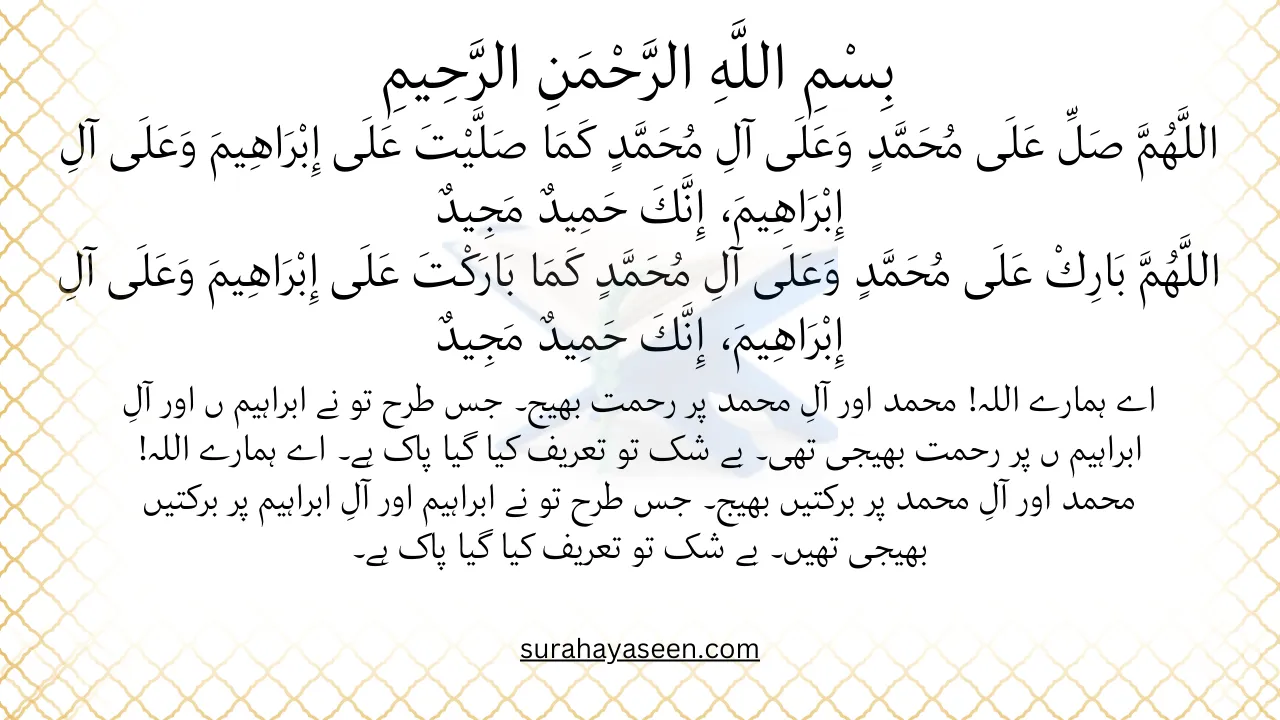Durood Ibrahimi Urdu, English, Translation,
Durood Ibrahim, also known as Darood e Ibrahimi, is a blessed prayer in Islam. It is recited to send Salawat upon the Prophet Muhammad ﷺ and his family. This prayer is a key part of daily Tashahhud prayer in Salah and holds a very high status in Islam.
Durood Ibrahim in Arabic

Urdu Translation
اے ہمارے اللہ! محمد اور آلِ محمد پر رحمت بھیج۔ جس طرح تو نے ابراہیم ں اور آلِ ابراہیم ں پر رحمت بھیجی تھی۔ بے شک تو تعریف کیا گیا پاک ہے۔ اے ہمارے اللہ! محمد اور آلِ محمد پر برکتیں بھیج۔ جس طرح تو نے ابراہیم اور آلِ ابراہیم پر برکتیں بھیجی تھیں۔ بے شک تو تعریف کیا گیا پاک ہے۔
Transliteration (Roman English)
Allaahumma salli ‘alaa Muhammadin wa ‘alaa aali Muhammadin, kamaa sallayta ‘alaa Ibraaheema wa ‘alaa aali Ibraaheema, innaka Hameedun Majeed.
Allaahumma baarik ‘alaa Muhammadin wa ‘alaa aali Muhammadin, kamaa baarakta ‘alaa Ibraaheema wa ‘alaa aali Ibraaheema, innaka Hameedun Majeed.
English Translation
O Allah, send Your blessings upon Muhammad and the family of Muhammad, as You have sent blessings upon Ibrahim (A.S.) and the family of Ibrahim. Indeed, You are Praiseworthy and Glorious.
O Allah, bless Muhammad and the family of Muhammad, as You have blessed Ibrahim (A.S.) and the family of Ibrahim. Indeed, You are Praiseworthy and Glorious.
This prayer sends peace and blessings on Prophet Ibrahim (A.S.) and on our beloved Prophet Muhammad ﷺ — uniting the two greatest prophets in Islamic tradition. You can also learn about Surah Yaseen which is highly recommended for daily recitation.
Significance and Virtues of Darood Ibrahimi
Importance in Salah
Durood Ibrahim is recited in the Tashahhud prayer during Salah. This makes it part of every Muslim’s daily spiritual practice. If you’re exploring Islamic essentials, the Six Kalimas, Ayat-ul-Kursi also form a key part of belief.
Hadith References
The Prophet ﷺ said: “The person closest to me on the Day of Judgment is the one who sent the most Durood upon me.” (Tirmidhi)
Companions asked the Prophet ﷺ how to send blessings upon him, and he taught them this specific supplication. (Hadith on Durood Sharif – Sahih Bukhari 3370)
Spiritual Benefits of Durood Ibrahim
1. Forgiveness of Sins: Reciting it often helps wipe away sins.
2. Ten Blessings from Allah: Every time you recite this Durood, Allah sends ten blessings, erases ten sins, and raises your rank ten times.
3. Prayers Accepted: When said before and after a dua, your supplication is more likely to be accepted.
4. Love for the Prophet ﷺ: Increases connection and closeness with Prophet Muhammad ﷺ.
Recommended Times for Recitation
• During Salah: After Tashahhud and before ending the prayer.
• Friday: Highly encouraged to send Salawat upon the Prophet abundantly on Fridays.
• Daily Life: Make it a habit during daily routines — while walking, working, or before sleeping.
FAQs
Conclusion
Durood e Ibrahim is a powerful and simple way to show love and respect for the Prophet Muhammad ﷺ. When we recite it, we are also sending peace and blessings on Prophet Ibrahim (A.S.), linking us to both great prophets. This Durood is part of the Tashahhud prayer, and saying it regularly brings countless rewards — including ten blessings from Allah, forgiveness, and answered duas.
Just as the Quran teaches us the significance of sending blessings upon the Prophet ﷺ, incorporating Durood e Ibrahim into our daily routines deepens our spiritual connection and strengthens our faith. Make this Salawat upon the Prophet a daily part of your life. The more we recite it, the more we grow spiritually and build a strong bond with the Prophet ﷺ. It’s truly a gift from Allah that fills our hearts with peace and brings us closer to Him.
